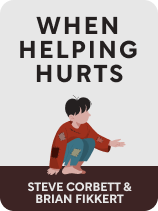

This article is an excerpt from the Shortform book guide to "When Helping Hurts" by Steve Corbett and Brian Fikkert. Shortform has the world's best summaries and analyses of books you should be reading.
Like this article? Sign up for a free trial here.
What are some possible solutions to poverty? How will these tactics help your local communities?
In When Helping Hurts, Steve Corbett and Brian Fikkert outline three specific intervention tactics for your church to consider as you contemplate ways to help the poor in your area. These tactics are job preparation, financial education, and opportunities for wealth accumulation.
Let’s discuss each of these solutions to poverty in turn.
1. Job Preparation
According to Corbett and Fikkert, one of the most effective possible solutions to poverty churches can offer is job preparedness programs, which serve to address the poor’s lack of education and training. They advise that an effective job preparedness program has several components:
First, it should train participants in soft skills such as teamwork and problem-solving from a biblical viewpoint. Second, it should address important job preparation skills like work ethic, punctuality, and appropriate dress.
Third, there should be a group of mentors who engage with participants one-on-one to encourage them, get to know them, and help them solve problems as they come up. Ideally, your mentoring team should be large enough that each participant can meet alternately with about five different mentors. This spreads out the mentoring workload so that individual mentors are less likely to feel overwhelmed.
Pairing participants with multiple mentors also allows them to network with more people, which opens up more job opportunities: There’s a greater likelihood that one of a participant’s mentors knows someone who knows of a job opening that’s a good fit for the participant if the participant has several mentors than if he just has one.
Fourth, while your church may not have the resources to teach “hard” (technical) skills like welding or computer programming, you can help the poor pursue further education at vocational schools and community colleges. There they can learn “hard” skills and obtain degrees or certificates that will improve their employment options.
Finally, try to get local businesses to agree to interview everyone who graduates from your job preparedness program. This will improve their chances of job placement.
2. Financial Education
Corbett and Fikkert maintain that another effective possible solution to poverty is financial education. This enables the poor to make the best use of their limited financial resources by helping them develop better financial management skills. The authors recommend that financial education programs follow several guidelines.
First, programs should cover topics like Christian stewardship, budgeting, saving, debt reduction, taxes, banking, and managing credit, among others. Second, when choosing a curriculum for the program, take into consideration the target population’s needs, education level, and cultural background.
Third, regardless of the specific curriculum, instructors should teach content from a biblical perspective that’s sensitive to the particular culture of the population. Finally, a team of mentors should foster long-term development by building relationships with participants and holding them accountable.
In addition to these guidelines, Corbett and Fikkert say that churches can guide participants in leveraging the US government’s earned-income tax credit (EITC) to mitigate low income, if capable of doing so. They explain that although it’s the largest federal program providing assistance to low-income working families, 15–25% of those who qualify either don’t know it exists or don’t know how to access it.
3. Opportunities for Wealth Accumulation
A final solution to poverty that Corbett and Fikkert suggest is designing interventions that target wealth accumulation. The purpose of this type of intervention is to offer the poor a better chance to save and grow their money. They say that according to a four and half year study, the poor are capable of—and successful at—saving enough to build wealth when given the opportunity.
Corbett and Fikkert say that one proven way to help the poor accumulate wealth is through Individual Development Account (IDA) programs, which help low-income individuals save toward an asset to increase their financial independence. They recommend that churches follow the guidelines of existing models:
First, have a savings-match policy where your church’s IDA matches the monthly savings of participants (which could be anywhere from a 1-1 to 3-1 ratio). These funds would come from the church itself, donations, foundations, and financial institutions that support IDA programs, or in some cases government programs.
Second, have participants save money for a specified purpose, such as continuing their education or acquiring a house or car. Once their goal has been reached, release the funds directly to the vendor to ensure that the participant uses the savings as intended.
Finally, offer financial education alongside the savings program. If possible or applicable, include training related to managing the specific assets that participants are saving for.

———End of Preview———
Like what you just read? Read the rest of the world's best book summary and analysis of Steve Corbett and Brian Fikkert's "When Helping Hurts" at Shortform.
Here's what you'll find in our full When Helping Hurts summary:
- How many Christian church missions actually do more harm than good
- A look into the true nature and causes of poverty
- Suggestions for how to help the poor more effectively







Thanks I also look forward to seeing poverty solved
And seek more knowledge to that